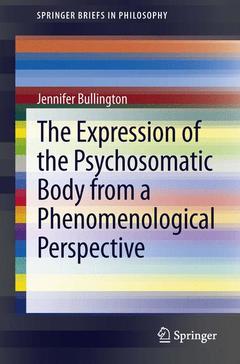The Expression of the Psychosomatic Body from a Phenomenological Perspective, 2013 SpringerBriefs in Philosophy Series
Auteur : Bullington Jennifer

This book is a contribution to the understanding of psychosomatic health problems. Inspired by the work of the French phenomenologist Maurice Merleau-Ponty, a phenomenological theory of psychosomatics is worked out as an alternative to traditional, biomedical thinking. The patient who presents somatic symptoms with no clearly discernible lesion or dysfunction presents a problem to the traditional health care system. These symptoms are medically unexplainable, constituting an anomaly for the materialistic understanding of ill health that underlies the practice of modern medicine. The traditional biomedical model is not appropriate for understanding a number of health issues that we call ?psychosomatic? and for this reason, biomedical theory and practice must be complemented by another theoretical understanding in order to adequately grasp the psychosomatic problematic. This book establishes a complementary understanding of psychosomatic ill health in terms of a non-reductionistic model allowing for the (psychosomatic) expression of the lived body. A thorough presentation of the work Merleau-Ponty is followed by the author?s application of his thinking to the phenomenon of psychosomatic pathology.
A unique approach applying Merleau-Ponty’s philosophy to psychosomatics
Covers and combines philosophy and health care praxis issues
Advances the understanding of complex psychosomatic symptoms
Provides a point of departure for a badly needed alternative approach to dealing with patients with psychosomatic issues
Includes supplementary material: sn.pub/extras
Date de parution : 04-2013
Ouvrage de 105 p.
15.5x23.5 cm
Disponible chez l'éditeur (délai d'approvisionnement : 15 jours).
Prix indicatif 63,29 €
Ajouter au panierThème de The Expression of the Psychosomatic Body from a... :
Mots-clés :
Holistic Health; Medically unexplained symptons; Merleau-Ponty on Expression; Merleau-Ponty on Meaning; Merleau-Ponty's Phenomenology; Modern Theories of Health; Phenomenological theory of psychosomatics; Phenomenology of Perception; Practice of modern medicins; The Visible and the Invisible; Work of phenomenologist Maurice Merleau-Ponty; materialistic understanding of health problems; understanding of psychosomatic pathology



